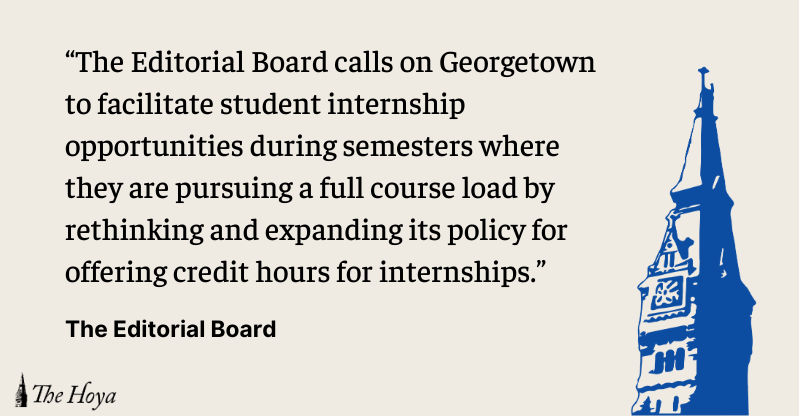Students have constantly argued that Georgetown University’s preprofessional culture can be toxic, but it seems that nothing has changed thus far.
If Georgetown is set on upholding this culture that values preprofessional experiences, then it must be willing to make these opportunities as accessible as possible to its student body.
The Editorial Board calls on Georgetown to facilitate student internship opportunities during semesters where they are pursuing a full course load by rethinking and expanding its policy for offering credit hours for internships.
While the Editorial Board recognizes the impossibility of a one-size-fits-all solution because of differences in the requirements and responsibilities of internships, we urge the university to at least begin implementing a system that could increase access to internships for all students.
We encourage Georgetown to institute changes to its policies in order to better support its students, especially first-generation and low-income students (FGLI), in their pursuit of professional growth and development.
More specifically, the Editorial Board urges the university to create more paths offering at least three credit hours — the number offered for most courses — for students working an internship that both aligns with their course of study and requires a significant time commitment.
Internships offer valuable opportunities for students to explore their academic and extracurricular interests in a professional setting, potentially opening future career paths. Obtaining an internship is often a necessary prerequisite for students to receive a job offer post-graduation, particularly for those pursuing careers in consulting and finance.
Especially for a school with a large student population interested in government and foreign affairs, Georgetown’s location in Washington, D.C., offers a valuable opportunity for students to take advantage of all the opportunities available in the nation’s capital.
Yet many popular D.C. internships are unpaid. For example, a number of positions at the U.S. Department of Treasury, the U.S. Department of State and the U.S. Senate and House of Representatives are unpaid opportunities.
Georgetown University can and should begin to fill the gap by offering credit to its students with internships.
Currently, the McDonough School of Business offers a series of courses that provide one credit hour for internships completed during a semester or over the summer. The only three-credit course offered requires students to complete 120 hours at their internship over the semester or summer. Many of these courses are available to students in all undergraduate schools. The College of Arts and Sciences (CAS) also offers a CAS-student-specific course.
Nevertheless, these courses, in either offering only one credit hour or placing unreasonably high expectations for a three-credit course, do not provide the support necessary for many students to take on internships.
Attempting to balance internship opportunities with the many responsibilities of being a full-time student with an intensive course load and numerous extracurricular activities poses challenges for students hoping to develop their resumes and skill sets.
Nirvana Khan (SFS ’24) felt this pressure when she was an intern for the U.S. Department of Commerce during the Fall 2022 semester.
“I would definitely say trying to intern 15 hours a week on top of a full course load was very stressful, and I felt really bad I couldn’t contribute as much as I wanted to in both my classes and at the internship,” Khan wrote to The Hoya.
“On top of that I was learning really similar things in both places and having credits for my internship definitely would’ve made sense and made it possible for me to give my best,” Khan wrote.
Georgetown falls short in making internships an accessible learning experience for students, especially its FGLI student population.
Many FGLI Hoyas must find jobs on campus to support themselves and their education, which can require an intensive time commitment. Thus, an unpaid internship is simply not a feasible option for many, given that they still must take a full credit load to ensure on-time graduation.
Corbin Buchwald (CAS ’25) shared these concerns.
“I believe that the current system of not providing credit for internships makes it difficult for individuals to balance an internship with their course load while limiting it to people that have the resources to do so,” Buchwald wrote to The Hoya.
By failing to provide adequate support for internships, Georgetown contributes to a system that benefits the wealthiest students who have the time and resources to work without pay.
“Decisions to award course credit for internships are made at the individual school level based on the specific curricula of their programs,” a university spokesperson wrote.
This process, however, fails to meet all student needs. The university must create a system that offers credits for internships.
Along with requiring 50 minutes of in-class time, each Georgetown credit is also expected to require two hours of work outside the classroom, totaling to approximately three hours of work per credit.
The Editorial Board recommends that the university use this metric in evaluating the number of credits it offers to students working internships, capping the number of internship credits over a student’s time as an undergraduate at six.
While the Editorial Board recognizes that these changes will take time to implement, they are imperative for creating the equitable system that Georgetown claims to desire.
Georgetown University has the chance to help their students access invaluable learning opportunities — there is no reason why they should not.
The Hoya’s Editorial Board is composed of six students and is chaired by the opinion editors. Editorials reflect only the beliefs of a majority of the board and are not representative of The Hoya or any individual member of the board.




















